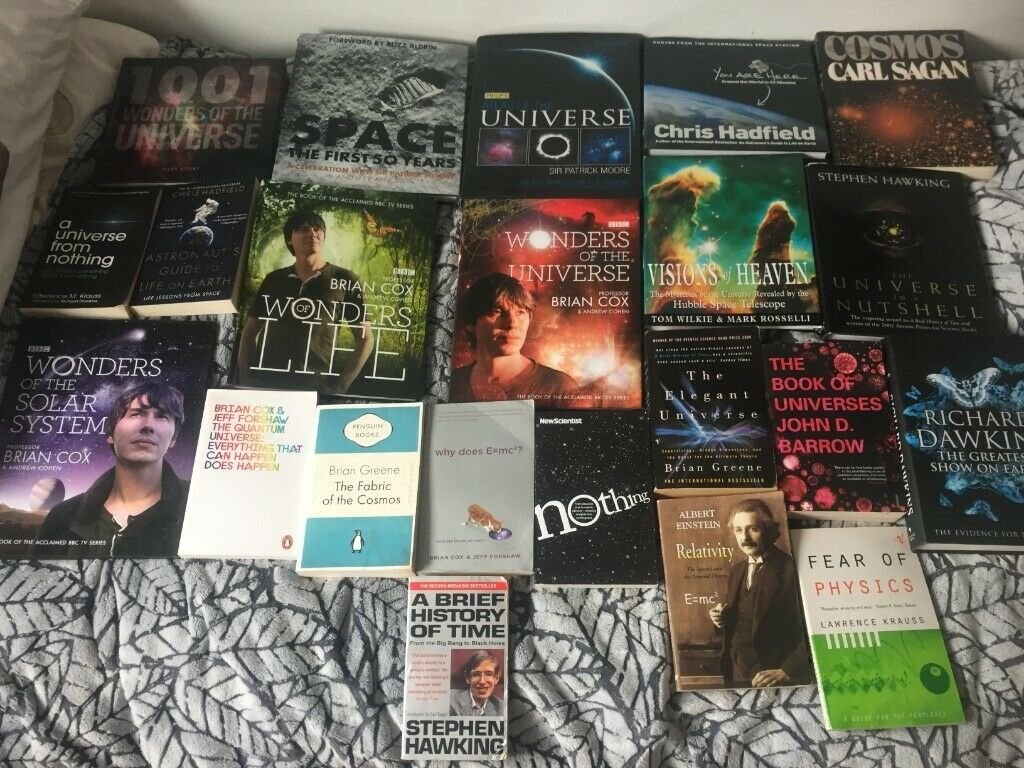Finding the best astrophysics books might seem like a daunting task, but a few standout titles can guide your journey through the cosmos. Start with Stephen Hawking’s “A Brief History of Time” to grasp the fundamentals. Next, dive into Carl Sagan’s “Cosmos” for a poetic exploration of the universe. Neil deGrasse Tyson’s “Astrophysics for People in a Hurry” offers a concise and engaging overview. These best astrophysics books make complex concepts accessible and exciting.
Best Astrophysics Books For Enthusiasts
When you walk into a bookstore or browse online, the vast array of astrophysics books can feel overwhelming. Whether you’re a novice stargazer, a budding scientist, or an enthusiast with a passion for the cosmos, finding the right books to ignite your curiosity and expand your knowledge is crucial. In addition to astrophysics, if you’re looking for the best books to increase knowledge in other areas, we’ve got you covered. Let’s dive into some of the best astrophysics books that cater to various interests and levels of expertise.
A Beginner’s Journey: Books for Novices
When starting out in astrophysics, you want books that explain complex concepts in simple language, often with beautiful illustrations. These books make learning about the universe both fun and understandable.
Astrophysics for People in a Hurry by Neil deGrasse Tyson
Neil deGrasse Tyson is a popular figure in the science community. His book, “Astrophysics for People in a Hurry,” is perfect for those new to astrophysics. The book answers fundamental questions about the universe in bite-sized chapters.
Key Features:
- Simple and concise explanations
- Entertaining and accessible to all ages
- Covers a broad range of topics from the Big Bang to black holes
Cosmos by Carl Sagan
“Cosmos” is a classic and essential read for anyone fascinated by the universe. Carl Sagan’s poetic writing and comprehensive approach make it an enduring favorite.
Key Features:
- Rich illustrations and photographs
- Combines science with philosophy
- Focuses on humanity’s place in the universe
Intermediate Exploration: Books for Enthusiasts
Once you have the basics down, it’s time to deepen your understanding with books that dive into more detailed theories and discoveries.
A Brief History of Time by Stephen Hawking
Stephen Hawking’s “A Brief History of Time” is a seminal work that breaks down complex ideas about time, space, and the universe.
Key Features:
- Introduces concepts like black holes and the Big Bang
- Written in an engaging, accessible style
- Includes diagrams to illustrate key points
The Fabric of the Cosmos by Brian Greene
For those interested in the fundamental structure of spacetime, Brian Greene’s “The Fabric of the Cosmos” is a must-read.
Key Features:
- Discusses string theory and quantum mechanics
- Explains the nature of reality and the universe
- Uses metaphors to make complex ideas easier to grasp
Advanced Study: Books for Aspiring Astrophysicists
As your knowledge deepens, you’ll want to explore more technical and detailed texts that cover advanced theories and the mathematics behind them.
Principles of Astrophysics: Using Gravity and Stellar Physics to Explore the Cosmos by Charles Keeton
Charles Keeton’s book is a fantastic resource for those looking to understand the physics governing stars and gravitational phenomena.
Key Features:
- Mathematical approach to astrophysics
- Detailed explorations of stellar dynamics and gravitational lensing
- Useful for both students and enthusiasts
Astrophysics for Physicists by Arnab Rai Choudhuri
This book is a comprehensive guide for those who already have a background in physics and want to apply that knowledge to astrophysics.
Key Features:
- Covers advanced topics like galaxy formation and exoplanets
- Includes mathematical derivations and problem-solving exercises
- Ideal for university-level students or serious hobbyists
Special Topics: Books on Specific Aspects of Astrophysics
Sometimes, you might want to dive into particular aspects of astrophysics, such as black holes, quantum mechanics, or cosmology.
Black Holes and Time Warps: Einstein’s Outrageous Legacy by Kip S. Thorne
Kip Thorne’s book provides an in-depth look at black holes, wormholes, and the nature of time.
Key Features:
- Combines scientific theory with adventure storytelling
- Discusses the historical development of black hole theory
- Includes contributions from other leading scientists
The Elegant Universe by Brian Greene
“The Elegant Universe” delves into string theory and its implications for the fabric of the cosmos.
Key Features:
- Explains string theory in an accessible manner
- Provides insight into the quest for a unified theory of physics
- Illustrates how string theory changes our understanding of reality
Books with a Historical Perspective
Exploring the history of astrophysics can offer valuable insights into how our understanding of the universe has evolved.
Coming of Age in the Milky Way by Timothy Ferris
Timothy Ferris traces the development of our understanding of the cosmos from ancient times to the modern era.
Key Features:
- Combines history with science
- Engaging narrative style
- Explores the contributions of key figures in astronomy
The Sleepwalkers: A History of Man’s Changing Vision of the Universe by Arthur Koestler
Koestler’s book explores the dramatic changes in our perception of the universe through history.
Key Features:
- Focuses on the lives and discoveries of major astronomers
- Analyses the shift from geocentric to heliocentric models
- Beautifully written and deeply insightful
Children’s Books on Astrophysics
It’s never too early to spark a child’s interest in the stars. These books make complex ideas accessible and fun for younger readers.
There’s No Place Like Space: All About Our Solar System by Tish Rabe
This Dr. Seuss-inspired book is perfect for young kids eager to learn about our solar system.
Key Features:
- Fun rhymes and illustrations
- Simple explanations of planets and other celestial objects
- Engages children’s imaginations
Mae Among the Stars by Roda Ahmed
This inspirational story is based on the life of Mae Jemison, the first African American woman to travel to space.
Key Features:
- Encourages children to dream big
- Colorful illustrations and an uplifting narrative
- Teaches perseverance and curiosity
Books with Stunning Visuals
Sometimes, the visual beauty of the cosmos is best appreciated through books full of stunning photographs and illustrations.
The Hubble Cosmos: 25 Years of New Vistas in Space by David H. DeVorkin and Robert W. Smith
This book showcases the incredible images captured by the Hubble Space Telescope over its first 25 years.
Key Features:
- High-quality images of distant galaxies and nebulae
- Accompanied by insightful commentary
- Shows the progress in our understanding of the universe
Infinite Worlds: The People and Places of Space Exploration by Michael Soluri
Soluri’s book takes readers behind the scenes of space missions, showcasing the people and technology involved in exploring the cosmos.
Key Features:
- Photographs from inside NASA
- Profiles of astronauts, engineers, and scientists
- Detailed look at the human side of space exploration
Books on Cosmology
Cosmology explores the origins and structure of the universe. These books delve into the big questions about the cosmos.
The First Three Minutes by Steven Weinberg
Steven Weinberg’s book focuses on the crucial first moments after the Big Bang, where the foundations of the universe were laid.
Key Features:
- Explains complex ideas with clarity
- Discusses the formation of the first elements and galaxies
- Provides a historical perspective on cosmology
Big Bang: The Origin of the Universe by Simon Singh
Simon Singh’s “Big Bang” tells the story of the theory’s development and the evidence supporting it.
Key Features:
- Historical and scientific narrative
- Explains the contributions of key scientists
- Accessible to readers without a scientific background
Whether you’re just beginning your journey into astrophysics or you’re looking to expand your knowledge further, the right book can open up the wonders of the universe. These books are excellent resources for readers of all levels, offering a range of perspectives on the cosmos that can satisfy any curiosity.
Frequently Asked Questions
What are some essential astrophysics books for beginners?
For those new to astrophysics, consider starting with “Astrophysics for People in a Hurry” by Neil deGrasse Tyson, “A Brief History of Time” by Stephen Hawking, and “Cosmos” by Carl Sagan. These books present complex concepts in an accessible way and provide a solid foundation for further learning.
Which textbooks are widely used in astrophysics courses?
Renowned textbooks for astrophysics courses include “An Introduction to Modern Astrophysics” by Bradley W. Carroll and Dale A. Ostlie, “Astrophysics for Physicists” by Arnab Rai Choudhuri, and “Astrophysics in a Nutshell” by Dan Maoz. These texts are commonly used in university courses and provide in-depth coverage of astrophysical principles.
Can you recommend books that focus on observational astrophysics?
“Observational Astronomy” by D. Scott Birney, Guillermo Gonzalez, and David Oesper and “Astrophysical Techniques” by C.R. Kitchin are excellent choices for learning about observational methods in astrophysics. These books cover the tools and techniques used to gather data from telescopes and other instruments.
What are some advanced books for those pursuing a career in astrophysics?
For advanced readers, “The Physical Universe: An Introduction to Astronomy” by Frank H. Shu, “High Energy Astrophysics” by Malcolm S. Longair, and “Galactic Dynamics” by James Binney and Scott Tremaine offer comprehensive insights into specialized topics. These books are ideal for graduate students and professionals in the field.
Are there any astrophysics books that blend science with storytelling?
Books like “The Elegant Universe” by Brian Greene and “Astrophysics of the Universe” by Edward Harrison combine scientific explanations with engaging narratives. These books not only educate but also captivate readers with the story of the universe and its mysteries.
Final Thoughts
For enthusiasts eager to explore the cosmos, the best astrophysics books offer a gateway to understanding the universe. These books cover topics ranging from the fundamentals of celestial mechanics to the mysteries of dark matter and black holes. By reading these insightful works, you gain knowledge and foster a deeper appreciation for the cosmos. Dive into these recommended titles to start your astrophysical journey today.

